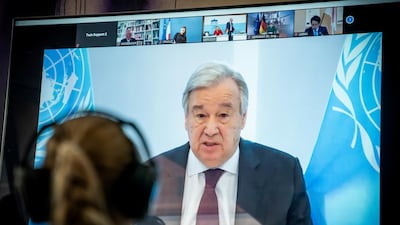UN Secretary General Antonio Guterres has warned world leaders that the coronavirus pandemic will cause “unimaginable devastation and suffering around the world".
Mr Guterres on Thursday addressed the largest gathering of world leaders since the pandemic began, calling for collective assistance for poor and developing nations.
He warned of historic levels of hunger and famine, and said that up to 1.6 billion people would be unable to earn a living unless action was taken now.
Mr Guterres told the meeting that the fallout from the crisis could lead to “a loss of $8.5 trillion [Dh30.12tn] in global output, the sharpest contraction since the Great Depression of the 1930s".
He called for immediate collective action in: enhancing global financial liquidity; providing debt relief; engaging private creditors; promoting external finance; plugging leaks in tax evasion, money laundering and corruption; and adopting a recovery that tackles inequalities, injustices and climate change.
Nearly 50 world leaders spoke at the video conference, along with economic experts including the heads of the International Monetary Fund and the World Bank.
But there were noticeable absences, among them the leaders of the world’s two largest economies, the US and China.
The two powers are engaged in rising tension over the pandemic and other issues.
China’s UN mission said it did not take part because of “a scheduling conflict” and submitted a written statement.
The mission from the US did not respond to requests for its absence.
Canadian Prime Minister Justin Trudeau, a co-host of the event, said the UN wanted to bring dozens of global leaders and finance experts together because “we need to think outside the box” in dealing with pandemic.
European Commission President Ursula von der Leyen called for “a global recovery initiative” that links investment and debt relief to UN development goals for 2030, which include eliminating extreme poverty.
“Europe is ready to put on the table expertise and resources, with both traditional and innovative financing instruments,” Ms von der Leyen said.
“But it should be a green recovery, a digital recovery, a just and resilient recovery.”
Mr Guterres said the “unprecedented human tragedy” behind the 5.5 million cases of Covid-19 and almost 360,000 deaths has been coupled with a devastating economic impact.
It spurred his call since March for a relief package equal to more than 10 per cent of the global economy.
“Developed countries have announced their own relief packages, because they can,” Mr Guterres said.
“But we have not yet seen enough solidarity with developing countries to provide them with the massive and urgent support they need.”
South African President Cyril Ramaphosa, speaking on behalf of the African Union, called on developed countries to meet commitments and “be innovative”.
Mr Ramaphosa said developing country debts were “the foremost concern, especially to my continent, Africa".
African nations are calling for a debt standstill for two years and more IMF special drawing rights.
Their leaders also support Mr Guterres's call for economic relief worth at least 10 per cent of global GDP, which would mean more than $200 billion in additional support for Africa.
Fiji’s Prime Minister, Josaia Bainimarama, said the pandemic's economic impact was "widening the gap between the developing and developed worlds, between north and south".
“As economies of small island states are left reeling, our tourism revenue is gutted and our lending capacity is limited," Mr Bainimarama said. "We cannot go at it alone."
Fiji relies on tourism for 40 per cent of its economy.


